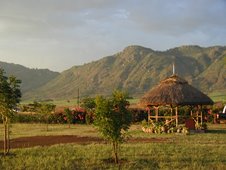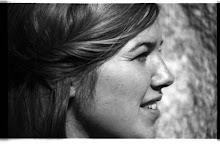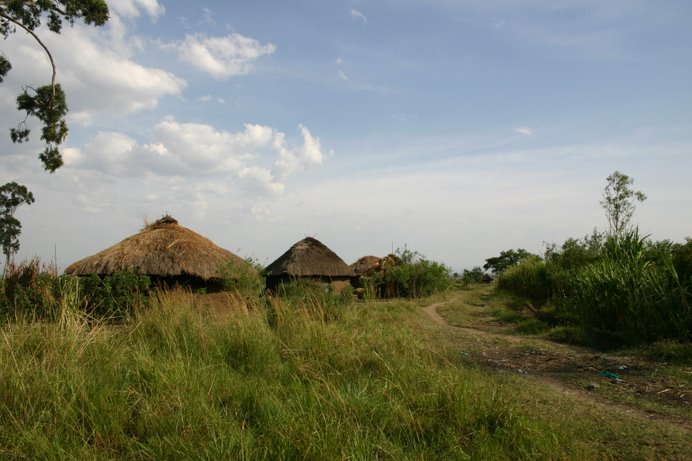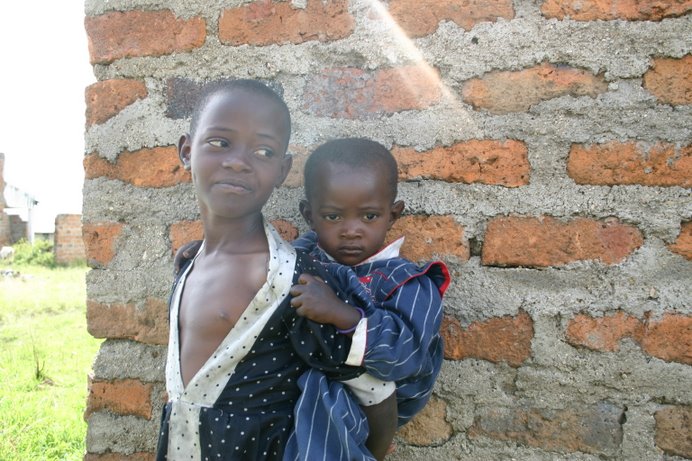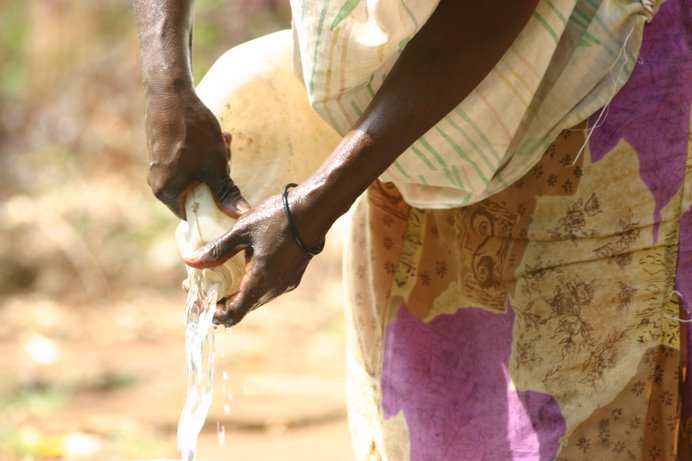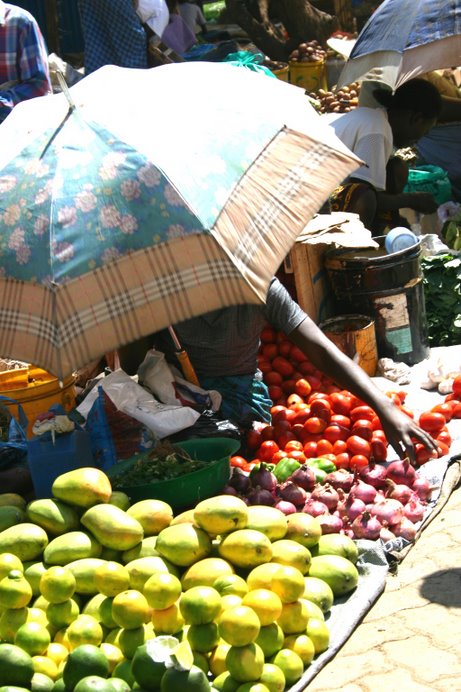I had a great time visiting my dear friend Janet, whom I used to live with here. We sat around waiting for the rain to stop late at night, telling tales with her mother in law and her neighbor. We took turns; they telling Luo tales and me racking my brain for any fairytale, revolutionary war story or whatever I could think of. Although I got stuck a few times during Rumplestilstskin and Repunzel, I realized it didn’t matter if I made it up, because they have never heard it before. Let me tell you a Luo story I heard twice over the course of the weekend, from different people, slightly different versions.
This is the story of Aluga Mager.
A long time ago, the Kipsigis and the Luos were fighting. The Luos had a warrior who was able to kill so many people and fight so bravely. Yet, this warrior could never be brought down. Nobody could kill him. One day the Kipsigis decided to offer peace by presenting the warrior with a beautiful lady from their tribe to be his wife. He accepted, but little did he know that they sent her to be a spy and find out his weakness. She took good care of him and earned his trust. Then one day he had a terrible headache. As was custom, they would make very small slices in the skin near the temple, then crush local plants inside to cure the headache. Aluga Mager, the warrior, told his wife to come to him and slice the temple of his shadow instead of his real head. She did so, and blood came out. He gave her the herbs and she rubbed them in the shadow’s wound. Immediately he was better, and she knew that her husband’s strength and weakness lay in his shadow, not in his physical body. So she went back to her tribe and told them. The next time they were in battle, the Kipsigis pierced his shadow with spears and he fell face down and died. His body turned to stone and still remains, half sunk in the earth at the base of the hills. I drove past the area and someone pointed out where he lay.
“Ooh last night we really storied didn’t we?” Clement said the next morning, telling me he would never forget the stories about the mermaid, or the lady with the baby, or the tiger butter or any other story I told.
Guavas
I can’t quite see them because the underbrush is so thick—taller than my eyes. But I can hear them shaking the branches, followed by a dull plop, plop, thud thud, bub bub of over ripe guavas hitting the ground. More branches move, sounding like the shake of a newspaper under the nose of a crosslegged, bespectacled man. They’re moving from tree to tree. They’re no thieves. There’s plenty and no one goes to these ones. They’re on the other side of that little wire fence which separates the farm from un-stomped and unconcerned vegetation. It’s no crime to go guava hunting, although perhaps it is more exhilarating to think so. Sometimes instead of monkeys, it is boys running hunch backed through the tall grass to the shelter of the first tree. Then the second. I am standing, watching from a distance—hardly able to escape noticing the red tee shirt darting through a mass of pale honey colors.
Recently in Kenya
There has been a lot going on here recently. Last month, it was tribal clashes over land. Fighting up near mount Elgon. A bombing in Nairobi on Monday. Now, as you may have heard in the news, the Mungiki sect has been instilling fear in many people because of their beheading people in Nairobi, then the police force, in it’s effort to control them, has killed many suspects and innocent people. The newspapers are full of articles about the power of group mentality and oaths, and how bold it makes people when they feel they are supported by a group. It is interesting to listen on the radio to BBC’s Focus on Africa, where Kenyans were calling in, talking about what should be done etc… If you’re interested in info on the presidential elections happening this year, or the Mungiki sect news, check BBC international news.
I was sitting at my friend’s place in Karunga when a helicopter noise sounded in the distance. “ The president! He usually takes a helicopter.” My friend said, looking out the door.
“What?” I said in awe. “ The presidents of Kenya, Tanzania and Uganda are coming to Kisumu today.”
“I’m going to find them of course!” I declared as I went outside to catch a matatu. I needed to go to town to find some baby nappys (diaper cloths) and baby things for my brand new little friend. Unfortunately I missed their speeches, but I came to a street crowded with people waiting for them to drive by. The police cleared the road of bicycles and overflowing vehicles, pushing the people to cue on the side. We waited and waited. I thought there might be some sort of parade. I asked a lady if he was coming. “Yes, yes, the problem is just we don’t know when. So we are all cued up like this just waiting.” “Ok, I’ll wait with you.” Eventually some fancy range rovers passed, some other important dignitaries, and police, but never the presidents. The police were taken away, and the people murmured their disappointment to each other, and dispersed dejectedly. So, I almost saw the presidents. Oh well.
On Sunday, some of us hiked to the river in the rain. We took off our shoes and waded in the muddy path past Karunga and up to the base of the hills. We knew the river, but not this part. It flowed swiftly with milky orange water from the red earth. On the way home from our wet adventure, a gazelle ran right in front of Steven Kitoto. He could have touched it. Immediately we were in the middle of a hunting party crossing the path. Men chasing the flying legs with dogs, spears and stationed arrow men who calmly greeted us as we ran out of the way!
Baby John
I saw Milkah heading home across the field. “Habari, Milkah?” I yelled from a distance. “Mzuri—Jane, mtoto hapa!” She yelled back making swishing motions down her front to say that Jane’s baby was born.
“What? Hapa leo—sangapi?” Now? Today? What time? I was so excited, I ran after her and Milkah, Laoclaudia and I all went straight away to Jane’s in Karunga to see the baby. We came into her dark room with the bicycle and the water containers and the little wooden table—then, from behind the curtained bed, she brought forth baby John, who she had had all by herself the night before. Now I go every morning to help Jane and watch baby John. He is so little and has soft curly black whisps of hair. The same day she had her baby, we had been talking about pregnancy with all the Mamas in our discussion group. Jane was not there. I had just asked them if anyone was pregnant, or if anyone wanted to tell their story of having a baby. They mostly described themselves being alone at night and delivering. Some of them are not even 17. Tuesday afternoons. The path goes above the river where they are always bathing and washing. Some babies are clinging to Mama’s legs in the water. I go down to help, hoping it will allow more of them to come quicker. There’s no time and no hurry, but it always takes at least an hour for everyone to gather under the tin overhang where we meet. They told us they wanted to know about sexually transmitted infections, our systems and pregnancy, so that is what we have been talking about for the last 3 months. Some don’t know much about what’s going on inside them, except that they’re belly’s getting bigger, then after several months, a baby comes out.
On Saturday…
I was just waling to the choo when I ran into Tom and Peter and Fred who gave me their usual Habari ahsubuhi’s and other morning greetings. I saw Tom pulling a rope with a ram tied on the other end. This is not an unusual gesture for Tom, but this morning I remembered something which made me eye them closely and hurry away. “You’re not going to watch?” Fred, the aging and forever smiling watchman called after me. “ I don’t think so.” I replied, already on my way. As I stepped farther and farther away, I had more and more of a mad possession to turn around and go back. “ Why did I tell myself last night I wasn’t going to? This doesn’t happen in my life everyday. I turned and headed toward them. By now they were tying the rope to a tree. The tree happened to be in the middle of a garden I had been preparing. “Where will you do it?” I asked, thinking of all the blood.
“Right here in your shamba!” Fred said grinning. They tied his legs tight up in the air, his back resting as a helpless hostage on the ground. Tom had a knife which he now sharpened, making that brushing metals noise. “Shlink…Shlink, Shlink…” went the blades. “RaaBllaa…baaa….arg blllaaa!” struggled the ram and the people were quiet. Fred and Peter held the body. Tom tilted the ram’s chin backward, baring the dirty white throat. I had my hands close to my vulnerable eyes—for some kind of protection, although I;m not sure why we shrivel to this position thinking it will somehow help us endure to watch. One deep cut at the jugular vein and out shot a heavy hose of blood wetting the grass. And covering Tom’s hands. They all stepped back a bit to let it come. Funny noises emerged from deep in the ram’s gut. Soon Fed took his ponga and hacked the exposed spine through the neck. It didn’t break. I’m not sure if it was supposed to. One by one the ropes were untied; having fulfilled their shady purpose, they were uselessly tossed aside. First they skinned the legs, making long slice down one side and peeling back the hide. Then a shallow slice was made just to penetrate the skin, but not to damage the muscle or fat. And this ram was so fat! With one hand you hold taught the first half of the belly skin and with the other, slice free inch by inch. Quite a delicate process to keep the flesh from sticking to the hide. It was no longer bloody, just fleshy and a bit foul stenched. Now I had already stayed and supported this slaughter so far, so I decided I might as well have some of the shame or glory or whatever it was, on my hands too. “Of course you can help” he says as he hands me the knife. It was a good thing I already detest sheep meat, because this may have ruined the prospect of our ram feast potluck. Later at the potluck Susan looked at me as I transferred some to her plate. “It has defeated you?” –a classic Kenyan term for “you don’t like it?” or, “you can’t eat it?”
Wednesday, June 13, 2007
Subscribe to:
Comments (Atom)
